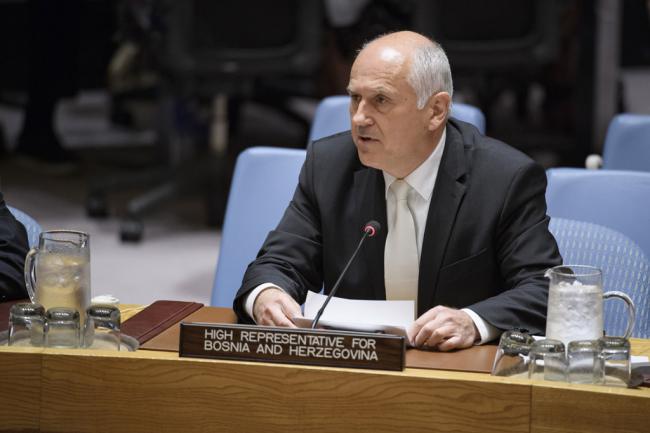
Challenges can derail Bosnia and Herzegovina from path of stability, Security Council told
“As we enter the third decade of peace implementation, it cannot be assumed that Bosnia and Herzegovina is on a glide path to a peaceful, viable State irreversibly on course for European integration,” said High Representative Valentin Inzko during a briefing on the situation in the country.
The Office of the High Representative was created in 1995 to oversee the Dayton Peace Agreement signed by the Republic of Bosnia and Herzegovina, the Republic of Croatia and the Federal Republic of Yugoslavia that formally ended the 1992-1995 Bosnian war.
“We need to be mindful of the fact that Bosnia and Herzegovina is a complex political and security environment, where negative scenarios can quickly endanger the Dayton Peace Agreement and the progress achieved after Dayton,” Inzko told the 15-member body, stressing the need for the international community to retain all the instruments at hand.
In this regard, he supported the EU military force’s presence on the ground with an executive mandate and its extension, an issue to be considered by the UN Security Council in November.
The EU military force is “a relatively inexpensive but necessary investment in peace and stability in the Balkans,” he said, as it provides an essential baseline of physical and psychological security that supports the EU, his Office and other international organizations.
Regarding the Euro-Atlantic integration, Bosnia and Herzegovina authorities formally received the EU Questionnaire in December and the adaptation of the Stabilization and Association Agreement with the EU took place in the same month.
Equally encouraging was the consensus and forward-looking pragmatism demonstrated by the country’s Presidency in adopting the so-called Defense Review of military forces last November, one of the requirements to participate in the NATO Membership Action Plan.
At the regional level, bilateral cooperation and overall reconciliation between Bosnia and Herzegovina and Serbia has continued to improve, he noted.
Bosnia and Herzegovina, however, faced some significant challenges over the last six months, including the controversy between Bosniak political representatives and Serb political parties over whether the country should submit a request for revision of the International Criminal Court’s 2007 judgment in the genocide case of Bosnia and Herzegovina and Serbia vs. Serbia.
In another negative development, Croat politicians have intensified calls for the “federalization,” which was understood by some to imply the further ethnic division of the country into three to four “federal units,” one of which would have a Croat majority.
Further, the situation with regard to rule of law continued to deteriorate, with corruption a serious problem.
These “will require continued attention and commitment from the international community,” he said.
UN Photo/Manuel Elias
Source: www.justearthnews.com
Support Our Journalism
We cannot do without you.. your contribution supports unbiased journalism
IBNS is not driven by any ism- not wokeism, not racism, not skewed secularism, not hyper right-wing or left liberal ideals, nor by any hardline religious beliefs or hyper nationalism. We want to serve you good old objective news, as they are. We do not judge or preach. We let people decide for themselves. We only try to present factual and well-sourced news.







